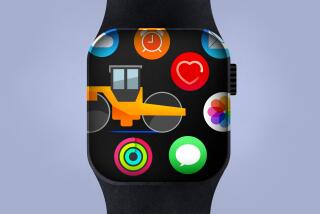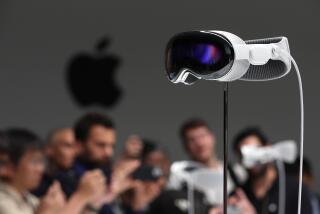Apple’s Woes Test Even Its Most Loyal Computer Fans
- Share via
To Marvin Price, his Apple Macintosh is not a machine. It’s an ideology.
A few months ago, when pundits began to predict the demise of Apple Computer as an independent company, Price, sensing conspiracy, set up his own propaganda machine on the Internet, churning out essays such as “Why I Prefer Macintosh” and soliciting pro-Mac testimonials from others.
The Los Angeles Apple fan is far from alone in his unremunerated devotion to the Macintosh, which has a cult following as strong as that of any commercial product in the history of American capitalism.
Hundreds of fans jam user group meetings across the country. Hollywood celebrities such as “Forrest Gump” producer Wendy Finerman do free ads for the company. Teachers sing its praises unbidden. Last week, as rumors swirled that Apple would be acquired by Sun Microsystems, a group of “concerned users” even circulated a proposal to stage a Mac-owner buyout of the floundering company.
“There are very few things in the world you can be sure of, and this is one of them,” says Price, trying to explain the phenomenon. “Mac is better than Windows.”
Perhaps. But less than 10% of personal computer users choose Apple, with most of the rest opting for machines based on Microsoft’s Windows software and computer chips from Intel Corp. And that weak market position has eroded the company’s finances and helped bring on the management crisis that culminated Friday in the ouster of chief executive Michael Spindler and the appointment of chip-industry executive and Apple board member Gilbert F. Amelio as the new chairman and CEO.
The change means that Apple won’t be sold in the immediate future, though many analysts believe the company is still destined to be a division of a larger firm eventually.
*
Industry observers tick off long lists of the strategic errors that landed the company in its current lurch, and they expect Amelio to cut costs and refocus the company on its most profitable markets. But as Apple struggles to remake itself, the key may lie in recapturing the spirit that allowed it to win the hearts and minds of its 22 million customers.
“What’s remarkable is that in spite of all the mistakes Apple has made, the loyalty still persists,” says Jonathan Seybold, a Malibu-based new media analyst. “And that’s what Apple could build on if they do things right. It’s hard to find a Mac user who doesn’t love the machine.”
At stake, users insist, is more than just another badly managed business hitting the skids. They say we’re in the midst of a crucial chapter in the computer industry’s long-running Holy War. It’s a war that pits Apple--”the computer for the rest of us”--against the formidable Microsoft/Intel axis that controls more than 80% of the world’s personal computers. In the Mac litany, Microsoft is the Evil Empire while Apple is a force for democracy.
“Right now the technology is equivalent to what happened during [the] Industrial Revolution in terms of changes in the social order,” says Ann Wrixson, executive director of the Berkeley Macintosh User Group. “We’re concerned that everyone have access, and what the Macintosh allows is for anyone to very quickly be up and running on a computer.”
Indeed, it has long been the consensus in the computer industry that while Microsoft made smarter business decisions and came to dominate the market, Apple had the better product--one that Microsoft eventually copied many features of for Windows.
While Microsoft Chairman Bill Gates knew how to make money, Apple was the soul of the industry, the company that came to symbolize the vision of individual empowerment that the high-tech revolution promised.
Even now, with the most recent version of Windows closing much of the gap between itself and the Mac, and with Microsoft trying to add personality to its software with products such as “Bob,” it is hard to find Windows users who will defend their system with enthusiasm approximating that of a Mac user.
“It does not garner the same sort of emotional reaction, that’s for sure,” says Jesse Berst, editorial director of Windows Watcher, an industry newsletter. “It’s just not as warm and fuzzy. It’s not as cute and friendly.”
*
But even some of the most zealous Mac lovers are finding it harder to keep the faith these days. Windows’ domination of the market means that the thousands of companies that write software applications--word processors and games and e-mail programs and the like--are concentrating their efforts on Windows machines. The same goes for companies that make accessories ranging from video accelerators to joy sticks.
“Its hard to see cool new stuff come out first for Windows,” one longtime Mac owner says.
“The Mac is still the best operating system,” says high-tech marketing guru Regis McKenna, referring to the underlying software that sets the Macintosh apart. “Everyone will tell you that. The question is now, does it have a place today, or is it a rebel without a cause?”
Apple introduced the Macintosh in 1984, when serious computing was still carried out on elaborate mainframes and minicomputers and what personal computers there were mostly used the arcane operating system called DOS. The DOS PCs, often referred to as IBM-compatible, required users to know a series of commands and symbols to operate them.
With the famous Super Bowl ad that showed a young girl striking a blow against IBM, personified as Big Brother, Apple unveiled the first personal computer with a so-called graphical user interface. It had a pointing device called a mouse, a smiley icon that welcomed users and a picture of a trash can in the corner.
The Macintosh upended all popular conceptions of what a computer was, and what it could be. At a time when IBM and huge mainframe computers had come to symbolize totalitarianism and mindless control, the Macintosh billed itself as the people’s computer.
“It spoke to the American spirit of innovation and risk, and rebellion against authority,” says Peter Rollins, associate editor of the Journal of Popular Culture.
Thus it became something of an icon. Like the Volkswagen Beetle or the classic Coke bottle, it symbolized a certain kind of vision. “Icons are created because people need symbols of their aspirations and their values,” says Rollins. “Apple became that for a generation of young people.”
Many former Apple employees say that what distinguished Apple from other companies was the near-fanatical focus on elegant engineering and making the machine easy and enjoyable to operate. The result was a product that appealed to many who might not otherwise have bought a computer.
Eve Lurie was working as a potter when her daughter brought home a Mac Classic from college in 1990. “I hadn’t used computers at all,” says the Oakland woman, who is now a Macintosh consultant. “I was in a completely different world. But I think it really has character. The little hand that counts down and up when you’re installing a program--I mean, you have to laugh.”
Susan Katz, a Los Angeles screenwriter, started out on the Apple IIe and has recently graduated to a Performa 630. “I like the look of the Mac. It’s sleek and nice to look at every day. I wouldn’t have any other machine,” she says.
But Apple did not leave all the marketing up to its missionary-users. The company sent teams of “evangelists” to schools and businesses and software developers with the goal of converting people to the Apple Way. It was not unusual for an evangelist to bake birthday cakes for particular members of their flock.
A special effort was made to recruit Hollywood to the cause.
“We definitely tried to make the Mac the next Range Rover, the next ‘have to have,’ ” says Daniel Paul, Apple’s former evangelist in Hollywood.
“There was a hipness to it for awhile, and I think it’s still true,” says producer Finerman. “You’d go someplace with your 540 C [a powerful Mac portable] and they would go, ‘ooh, I want one of those.’ ”
But the real father of Hollywood’s fascination with the Powerbook is former Fox Chairman Barry Diller, whose quote in a 1993 New Yorker article “My odyssey began with the Powerbook” made his colleagues take heed.
Yet since his stint as chairman of home shopping giant QVC, Diller says, he’s been using an IBM ThinkPad. “I had to switch because QVC didn’t use Macs,” says Diller, now chief of Silver King Communications.
Diller’s switch reflects the reality that many Mac users are facing today. Dedicated though they may be to their platform, the prevalence of Windows-based machines in businesses and increasingly in schools is forcing many to switch over at home.
And Windows users are getting more uppity. “I’m sick of the superiority complex of these Mac users,” one poster wrote on an Internet newsgroup last week. “Let’s face it, Apple is passe.”
If Amelio, who takes the reigns at Apple on Monday, can’t put the company on firm footing, some loyal followers have a suggestion: “Consider the possibility of a virtual takeover,” wrote a group calling itself Concerned Silicon Valley Engineers Who Use Macs. “Remember, Mac owners are a dedicated bunch, and this is the first time we’ve really been threatened--so we need to show them who they’re dealing with.”
Times staff writer Martha Groves contributed to this story.






